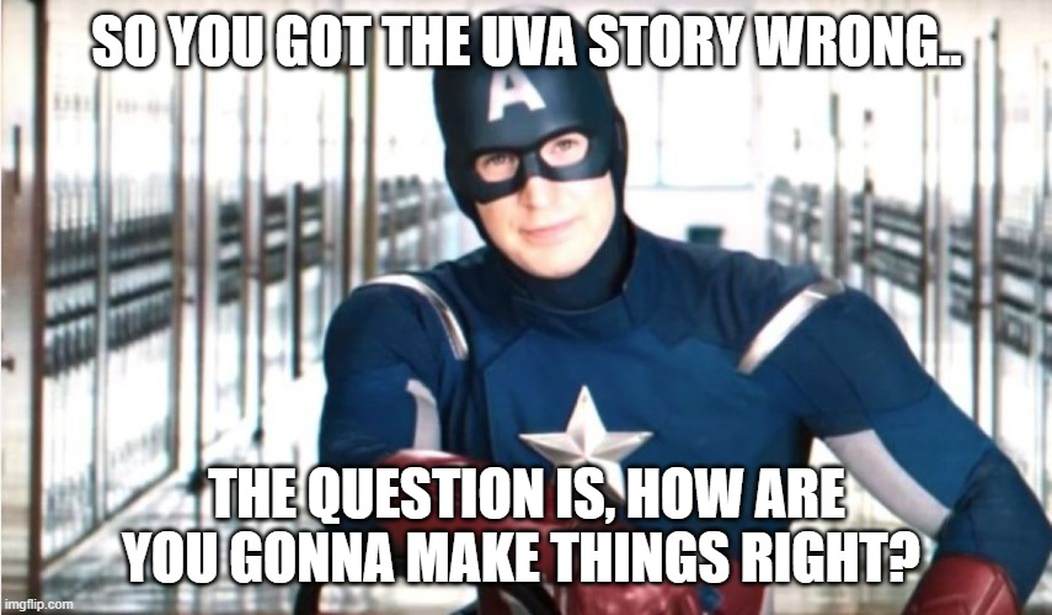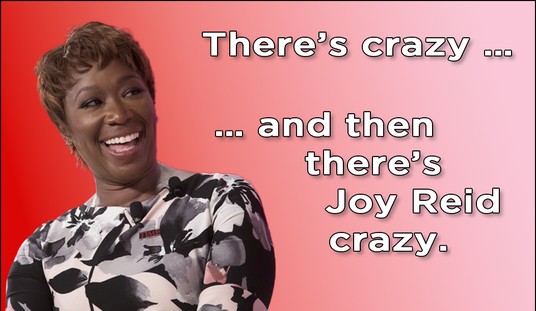Jann Wenner (who is a man) is a co-founder of Rolling Stone magazine. In 2019, he left the magazine, but he’s now got books to sell, so he is doing interviews. And deep in his interview with the New York Times, we got one of the all-time journalistic whoppers:
Remarkably delusional quote in the New York Times today from Rolling Stone magazine co-founder.
— T. Becket Adams (@BecketAdams) September 15, 2023
Other than the fact that the key allegation in the since-retracted UVA rape story was fake, the story was "bulletproof."https://t.co/g9gqwje7qB pic.twitter.com/7E561Y7Kg2
To give a little background, Rolling Stone ran an article a few years back talking about how rapes are handled on campus and giving a harrowing account of how the University of Virginia (UVA) handled it when a woman was allegedly gang raped by members of a fraternity. And you probably remember that it turned out the story of that rape was a complete lie. Well, here’s the full exchange in the article (the interviewer’s words are in bold):
Rolling Stone had a history of producing certain kinds of stories that ended up being definitive. But there were a handful of stories that raised questions of integrity. The U.Va. campus rape story would be one of those. Even Hunter S. Thompson — I don’t know that anyone would hold him up as a beacon of factual accuracy, regardless of the literary merit of his stories. Was there anything endemic to Rolling Stone that caused you to put the pursuit of the juicy story ahead of concerns with accuracy?
One word answer: no.
Is it just one-offs?
The University of Virginia story was not a failure of intent, or an attempt to be loose with the facts. You get beyond the factual errors that sank that story, and it was really about the issue of rape and how it affects women on campus, their lack of rights. Other than this one key fact that the rape described actually was a fabrication of this woman, the rest of the story was bulletproof. It wasn’t for recklessness. I mean, we made one of those errors — every publication in the country, including The Times, makes every 50 years at least. You get slammed for it. We took our beating. But it wasn’t indicative of how we operated. It wasn’t an error of being casual with the truth, or trying to stretch it, or mission creep, or anything like that.
There are no words. Well, okay, Mr. Adams has some words:
Hard-pressed to think of another industry where massive eff ups are so regularly written-off with flip variations of "it had the ring of truth to it" and "it started an important conversation.”
— T. Becket Adams (@BecketAdams) September 15, 2023
Weathermen. That's all I got. Only other group I can think of that can be 100% wrong and get away with a shrug.
— T. Becket Adams (@BecketAdams) September 15, 2023
Well, Climate Scientists, too. And one man humorously suggested another group can get away with being 100% wrong and get away with it.
Jim Cramer has entered the chat
— Hamburglar of Banff 🇦🇺🇺🇸 (@el_whyen) September 15, 2023
*snort*
More seriously, and as @HaikuJonah notes, the weathermen and stock bros are in the game of predicting future events, not recounting the past. Some leniency for screwing up the former. Not so much for the latter.
— T. Becket Adams (@BecketAdams) September 15, 2023
But let’s quote from another thing Wenner said about it:
There are two main things in the story. One was the account of this gang rape given to us by this source, Jackie. That turned out to be a fabrication. Because we didn’t want to identify her, we didn’t demand to meet people to corroborate her story. Our mistake was to let her out of that demand, not wanting to put her through the trauma again.
As you will recall, he also said the overarching point of the article is ‘it was really about the issue of rape and how it affects women on campus, their lack of rights.’ Whatever truth there is to that, the proposed reform is typically to erode the due process rights of the accused, and what could be a better illustration of how important those due process rights are, than Rolling Stone’s failure? They ran a shoddy investigation that amounted to ‘believe all women!’ because being fair to the accused didn’t matter to them, and, in the process, they achieved an outcome so perfect, we couldn’t have planned it ourselves.
Sabrina Erdely disappeared from the face of the earth.
— jimtreacher.substack.com (@jtLOL) September 15, 2023
Fake but accurate, v2.0
— MoronicHeadline (@MoronicHeadline) September 15, 2023
Like me running a 5K. I ran a kick-ass 3.5K
— AmishDude (@TheAmishDude) September 15, 2023
Straight up "morally correct, but factually inaccurate" territory
— Social Distance Champion (@realchrishynes) September 15, 2023
So other than *that*, how did you enjoy the play, Mrs. Lincoln? https://t.co/yEX2ROLTvI
— Hood of Judgement (@BozOzler) September 15, 2023
Retracted @RollingStone article came out in Nov. 2014. By then, both the Dear Colleague letter & the @CatherineLhamon "Q&A" guidance had been issued, tipping campus TIX processes against acc'd students. To say that female accusers had a "lack of rights" that point is ahistorical. pic.twitter.com/hDZbPhgmK6
— KC Johnson (@kcjohnson9) September 16, 2023
This is exactly what I was thinking as I read the quote....
— KC Johnson (@kcjohnson9) September 16, 2023
Translation: We’ve learned nothing and this will absolutely happen again.
— Brett (@brettchris3) September 16, 2023
To be fair, he has left the company. But that was years after the UVA debacle, so it seems likely that he probably reflects a culture that remains.
"Other than this one key fact that the rape described actually was a fabrication of this woman, the rest of the story was bulletproof..."
— Wesley Yang (@wesyang) September 16, 2023
This sentence was spoken in earnest. https://t.co/v5CK0XZng3
Imagine, a bulletproof narrative but for one nasty little detail. It was a complete and total lie.
— Scott Greenfield (@ScottGreenfield) September 16, 2023
But it was the preferred narrative, and really, isn't that what really matters? https://t.co/HONNxwrzky
This is what decades of cocaine abuse will do to a person's reasoning abilities. https://t.co/HlGS1zYwtJ
— jimtreacher.substack.com (@jtLOL) September 16, 2023
We can't confirm about the cocaine, but we can laugh.
Rolling Stone’s $1.65 million settlement over its defamatory article was clearly way too low https://t.co/O01g0wzDjb
— Chuck Ross (@ChuckRossDC) September 16, 2023
Also, we are not going to read the whole interview. But the headline had something else that caught our eye:
The co-founder of Rolling Stone magazine on the legacy of boomers and why he chose only white men for his book on rock’s ‘masters.’
So one issue is possible racism. Now, to be fair, it is a book of interviews with significant rock stars, and all of them are significant. The title of the book is ‘The Masters: Conversations with Lennon, Jagger, Townshend, Garcia, Bono, and Springsteen.’ That is undeniably an impressive list. Still it is weird to talk about ‘masters’ of music, even if we limit it to Rock and Roll, and include zero black people. Its not quite as bad as an actual history book having a cover where the Germans bomb Pearl Harbor (yes, that's a real thing), but its close. And when they get into the issue in the interview, you can sense things got uncomfortable:
There are seven subjects in the new book; seven white guys. In the introduction, you acknowledge that performers of color and women performers are just not in your zeitgeist. Which to my mind is not plausible for Jann Wenner. Janis Joplin, Joni Mitchell, Stevie Nicks, Stevie Wonder, the list keeps going — not in your zeitgeist? What do you think is the deeper explanation for why you interviewed the subjects you interviewed and not other subjects?
Well, let me just. …
Carole King, Madonna. There are a million examples.
When I was referring to the zeitgeist, I was referring to Black performers, not to the female performers, OK? Just to get that accurate. The selection was not a deliberate selection. It was kind of intuitive over the years; it just fell together that way. The people had to meet a couple criteria, but it was just kind of my personal interest and love of them. Insofar as the women, just none of them were as articulate enough on this intellectual level.
Oh, stop it. You’re telling me Joni Mitchell is not articulate enough on an intellectual level?
Hold on a second.
I’ll let you rephrase that.
All right, thank you. It’s not that they’re not creative geniuses. It’s not that they’re inarticulate, although, go have a deep conversation with Grace Slick or Janis Joplin. Please, be my guest. You know, Joni was not a philosopher of rock ’n’ roll. She didn’t, in my mind, meet that test. Not by her work, not by other interviews she did. The people I interviewed were the kind of philosophers of rock.
Of Black artists — you know, Stevie Wonder, genius, right? I suppose when you use a word as broad as ‘masters,’ the fault is using that word. Maybe Marvin Gaye, or Curtis Mayfield? I mean, they just didn’t articulate at that level.
How do you know if you didn’t give them a chance?
Because I read interviews with them. I listen to their music. I mean, look at what Pete Townshend was writing about, or Jagger, or any of them. They were deep things about a particular generation, a particular spirit and a particular attitude about rock ’n’ roll. Not that the others weren’t, but these were the ones that could really articulate it.
Don’t you think it’s actually more to do with your own interests as a fan and a listener than anything particular to the artists? I think the problem is when you start saying things like ‘they’ or ‘these artists can’t.’ Really, it’s a reflection of what you’re interested in more than any ability or inability on the part of these artists, isn’t it?
That was my No. 1 thing. The selection was intuitive. It was what I was interested in. You know, just for public relations sake, maybe I should have gone and found one Black and one woman artist to include here that didn’t measure up to that same historical standard, just to avert this kind of criticism. Which, I get it. I had a chance to do that. Maybe I’m old-fashioned and I don’t give a [expletive] or whatever. I wish in retrospect I could have interviewed Marvin Gaye. Maybe he’d have been the guy. Maybe Otis Redding, had he lived, would have been the guy.
Yikes. Pardon us, while we cringe so hard we disappear into a singularity.
***
Editor's Note: Do you enjoy Twitchy's conservative reporting taking on the radical left and woke media? Support our work so that we can continue to bring you the truth. Join Twitchy VIP and use the promo code SAVEAMERICA to get 40% off your VIP membership!






















Join the conversation as a VIP Member